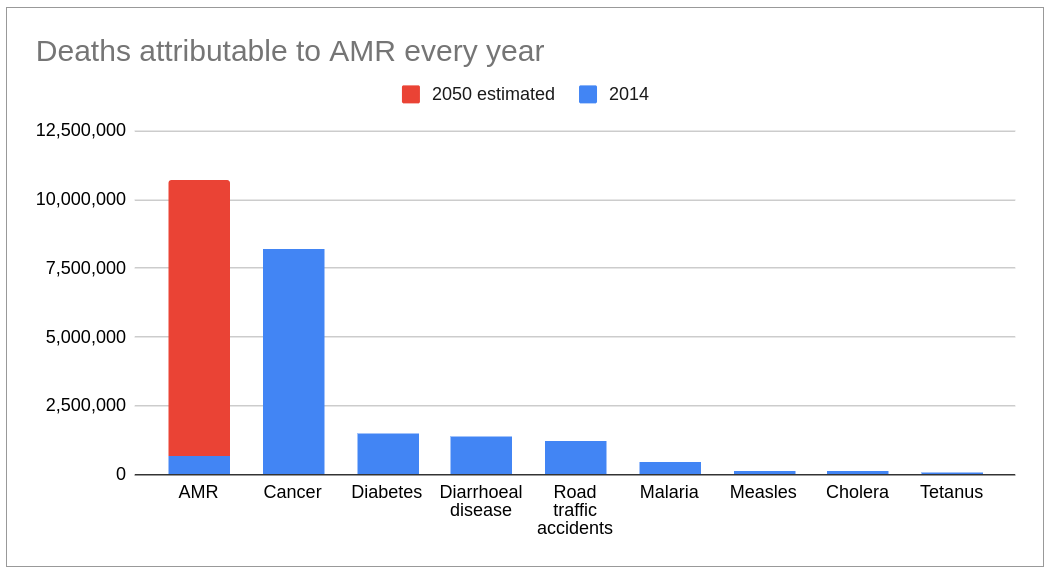
AMR, climate change and biodiversity loss
Sustainability themes are rarely mutually exclusive. Three big ones are inextricably linked.
Summary: A collaborative report from Aviva Investors, the University of Exeter Medical School and the British Society for Antimicrobial Chemotherapy titled "Confronting a permacrisis: the intersection between antimicrobial resistance, climate change and biodiversity loss." By 2050, the impact of antimicrobial resistance (AMR) left unchecked could be profound. It is picking up a pace too with, for example, 20% of previously treatable tuberculosis now resistant to antibiotics.
Why this is important: There are strong connections between AMR and two other systemic threats: climate change and biodiversity loss. Global healthcare costs could increase by up to US$1 trillion, 28 million people could fall into poverty, global livestock production could fall by up to 7.5% and global exports could fall by 3.8%.
The big theme: Antimicrobial Resistance (AMR) is a macro threat to the sustainability of the human race and other species. It is of a similar level to that of the worst impacts of climate change and biodiversity loss. Together they pose a triple threat with many overlapping underlying causes and exacerbating factors. For AMR, bringing together biological, behavioural, and physical solutions with appropriately incentivising funding we should be able to continue to enjoy the benefits of our microbe partners whilst avoiding their darker side. This is potentially a massive, if complex, investment theme for those who care about sustainability; the potential goes well beyond the pharma industry.

The details
Summary of my takeaways from the Aviva Investors Antimicrobial Awareness Week event.
"I had always thought that medicine was infallible. It would eventually solve all things." (James Alexander, UK Sustainable Investment and Finance Association)
Epiphany moments: The first panel of the event featured a varied group of speakers who detailed their 'epiphany moments' or the point at which they realised the scale and importance of AMR. Tytti Kaasinen (Engagement Director, Council on Ethics Swedish national pension funds AP 1-4) had been aware on the periphery for a number of years but over the past year a friend contracted Lyme disease rendering her vulnerable to infection which brought the issue home to her. Sofia Condes (Senior Investor Outreach Manager, FAIRR) remembers attending a public health lecture given by Professor Peter Piot (renowned microbiologist) who was asked what three issues kept him up at night. He said (i) an airborne lethal virus, (ii) obesity and malnutrition and (iii) AMR. Sofia saw the link between the food system which was at that time her primary area of study and AMR with 70% of antibiotics going to animals. Finally, James Alexander (Chief Executive, UK Sustainable Investment and Finance Association) had always felt that "medicine was infallible." As he got older he realised that really wasn't the case. A big concern for him is that people do not yet recognise the scale of the challenge - analogous to the early stages of climate change. Whilst governments with policy and regulation are important, lots of people can do lots of little things.
The event also launched a collaborative report titled 'Confronting a permacrisis' authored by Abigail Herron (Global Head of ESG Strategic Partnerships, Sustainable Finance Centre for Excellence, Aviva Investors), Professor Will Gaze (Microbiologist, University of Exeter Medical School's European Centre for Environment and Human Health) and Michael Corley (Deputy Chief Executive, British Society for Antimicrobial Therapy). The report lays out the intersection of three planetary crises: AMR, climate change and biodiversity and the complex ways in which they are linked. The concluding key policy asks are:
1. Create an international panel of scientists to address AMR (similar to the Intergovernmental Panel on Climate Change, IPCC).
2. Ban the use of antimicrobials in agricultural supply chains for prophylactic treatment (taken preemptively) and growth stimulation (similar to the Montreal Protocol that saw CFCs scaled down to help protect the ozone layer).
3. strengthen antimicrobial development through 'pull' incentive mechanisms for the developers of novel antimicrobials (the UK NHS is leading the way here with their 'subscription model').
4. Develop coherent national responses - in particular incorporating AMR explicitly into sustainable disclosure requirements and financial regulators' supervisory processes.
5. Have tighter standard setting and enforcement of water quality.
What I found interesting: I have been covering AMR for a few years now and so there wasn't much of the technical content that was new to me. Often these events are really useful in understanding where the gaps in the knowledge are or in understanding the connections that people are making. It was encouraging to see that the 'unsexy' area of hygiene and behavioural changes were seen as important. In particular the critical need to address shortfalls in the provision of clean water and sanitation in both developed and developing nations is a nexus point for solutions addressing the triple systemic threats of AMR, climate change and biodiversity loss. There was a recognition that there is no 'Greta' or 'Polar bear on an ice flow' for AMR and so it has not captured the imagination of the public in the same way as climate change has. That also means that it is lower down on the political agenda. Awareness generation is critical. One area that didn't seem to have as much focus were physical solutions. How can material science and physics help with the issues created by AMR? This is an area that I shall cover in a longer blog in the coming days.
Why this is important
A study estimating the AMR burden in 2019 published in January 2022 in The Lancet found that 1.2 million deaths were attributable to bacterial AMR globally. That means that AMR is the leading cause of death, higher than HIV/AIDS (~up to 860,000) or malaria (627,000). The study’s co-author Professor Chris Murray from the University of Washington commenting on the O’Neill report estimate of 10 million deaths per annum by 2050 said that “...we now know for certain that we are already far closer to that figure than we thought.” Low Income and Middle Income Countries (LIMIC) are disproportionately impacted by infections. Children in sub-Saharan Africa are more than 14x more likely to die before the age of 5 than children in high income countries.

Antibiotics and other antisepsis measures revolutionised surgery and healthcare. Highly invasive operations, such as gut surgery and joint replacements all depend on antibiotics to prevent infection and be successful. Certain treatments which render the immune system less effective, such as chemotherapy, are made viable by the support provided by antibiotics. Where previously catching certain infections was pretty much a death sentence, antibiotics and other antimicrobials provided hope.
If at the high level we are “running out of antibiotics that work” the natural focus would be to “find more antibiotics.” It is however only one avenue - biological (pharmacological). We can also look at ways to reduce the chance for microbes to develop resistance by reducing the need to use them in the first place. There are behavioural changes including improving hygiene at personal and corporate levels and potentially changing how people interact to reduce the risk of spreading infection. Plus, using antimicrobials only for the appropriate infection, and reducing waste antimicrobials from entering water systems. However, through our understanding of the way in which microbes interact with us, there may be ways to disrupt them physically and stop them being pathogenic, for example stopping them forming biofilms. Finally, as with any innovation that requires transition the right financial and political incentives need to be in place. What is clear is that a concerted effort is needed if AMR is to be controlled.
You can learn more about AMR through our primer.

Something a little more bespoke?
Get in touch if there is a particular topic you would like us to write on. Just for you.
Contact us
Please read: important legal stuff.


